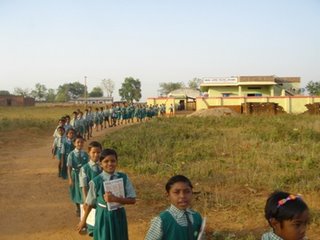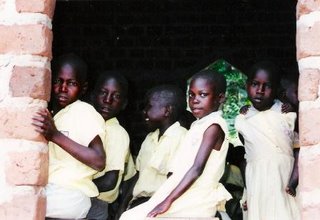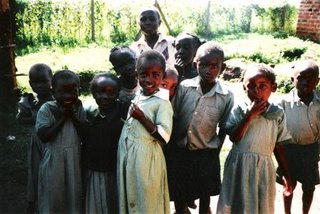

(Written by Scott VanderKooy, president of Worldwide Christian Schools.)
From a North American perspective, the town of Kesinga, in the Indian state of Orissa, is in the middle of nowhere. The easiest way to get there from outside is to fly to Calcutta and then take a train 15 hours southwest. Officially, English is the “functional” language of India, but few Indians outside the major cities speak it. There are over 200 languages in use within India, so even Indian-to-Indian communication is often difficult. India’s recent economic growth has not affected Kesinga.
Typical life in this small town involves waking up with your family in a 12-foot by 8-foot brick- walled structure with a tin roof. Without electricity or plumbing, 90% of the town’s residents use a field as their toilet. Those who have electricity can’t rely on it.
Most people in Kesinga spend their morning scratching out a living growing rice or scavenging for food. The average temperature in April is 105 degrees Fahrenheit, so the midday and afternoon is spent in the shade, if possible. As is common in India, one community pond serves as the drinking fountain, bathtub, pool, and livestock watering hole. This practice spreads disease. Education is the only way unhealthy habits can be broken and lives improved.
Six days a week at 6:30 a.m., a single line of 50 green-uniformed children, a ribbon of green, makes its way 2.5 miles to school through Kesinga. Passing street vendors, a Hindu temple, and even the local Hindu school, the children never waver until they reach a rented building they meet up with 38 other children from the town. After attendance and a check for lice, the children sit cross-legged on the floor in one of three classrooms, or in the entryway, which is currently functioning as a fourth classroom.
WCS field partners Siani and Suphala Harpal founded new Life Christian School one year ago, in May of 2005. This husband and wife team wanted something better than Hindu training for the children who lived in the orphanage they ran together. In less than one year, 38 new community children from Hindu families have also joined the orphans. This fact makes it clear that many in this Hindu town recognize that New Life offers a better academic option for their children.
WCS first met Siani and Suphala at the WCS Teacher and Leadership Training Conference in Bangalore in 2004. Although they didn’t have a school in Kesinga yet, it was clear that they were located in an area were Christ-centered schools did not exist.
Places like Kesinga are exactly where WCS is called to be. After a thorough partner evaluation process, WCS decided to fund New Life in May of 2005. I went in April of 2006 to assess the new school on behalf ofthe WCS Asia Team. WCS doesn’t own or operate schools outside the US, therefore we must be able to depend upon indigenous partners, like Siani and Suphala, to operate the school according to the highest spiritual, academic, and accountability standards.
When WCS assesses a school, it looks at the students, teachers, principle, and field partners. WCS field partners are often pioneers. This is especially true when located in an area unfriendly to Christians. Orissa is one of the most militantly Hindu states in India. Although not usually reported, on average at least one Christian a month is killed in Orissa because of their faith in Christ.
Hindus represent 99% of the population; therefore WCS partners must be able to effectively convince even that skeptical community of the value the school brings. During my last trip to India in the month of April, I witnessed this situation firsthand. Siani, Suphala and I were walking one night when a group of Hindu leaders surrounded us on the path. In the Hindi language they demanded to know why the children had to walk to school and back each day. “Why is there no bus?” they asked. It was obvious to me that their real concern had more to do with religion than the safety of the orphan children. But Siani calmly and confidently explained to them that the school hopes to buy a bus someday, but for now it is good education for the children to see commerce in the wonderful town of Kesinga each day. With just a few statements, Siani found a way to unite two opposing sides around a common circumstance. This is the type of diplomacy that WCS field partners must have.
Field partners must sacrifice for the cause of Christ on a daily basis. New Life’s principal lives in a small room at the school. The three teachers live at the orphanage along with Siani and Suphala, and 52 children. They are paid approximately $25 per month over and above room and board. All are certified teachers and are working toward college degrees, or have already secured degrees and are working toward advanced degrees. The character of field partners and teachers says a lot about New Life, but the most important test of a school is its students.
The way children sing when they think no one is listening says something about their spirit. The kids of New Life joyfully meet at 5:00 every morning to sing together, often without the encouragement of adults.
A second indicator is what these children tell you when you talk with them one- on-one. I had a conversation in English with David, who is in grade six. “I want to be an Engineer,” he told me, “and I know it is possible because God loves me.”
Student performance at New Life is tracked closely and is used by the staff to shape teacher training. New Life Christian School passes the WCS test for field partnership. This school has a contagious Christ-like spirit and a strong commitment to quality education that runs through the entire organization.
New Life is not content with the status quo and actively participates in and plans for the annual WCS Teacher Continuing Education (TCE) Conference along with WCS staff-members Gloria Stronks and Jennifer Hartman. The school is a charter member of the new WCS India Association, a group of schools and leaders who are working together with WCS to create a new standard of Christian schools with- in India. New Life Christian School is a ribbon of green in a spiritually and educationally dry community.
Because of this school, a new generation is learning about the one true God and the opportunities and responsibilities in His world. WCS gives New Life $700 per month. This sum pays for four staff members, rented space, and makes it possible for over 80 children of Hindu background to go to a Christian school. As they say, if you can find a better deal for your
contribution dollar, take it!
In faith, WCS has committed to fund New Life for an additional year. There are TWO ways in which you can help New Life School through WCS. First, you can donate toward a new building for New Life that will house both the orphanage and school. New Life currently rents both facilities, and a building of their own will eliminate the 2.5 mile walk to school each morning on busy roads. Second, New Life Christian School has recently become a part of the WCS School Sponsorship program.
Please pray for direction as WCS works with donors to create long-term funding for this pioneering school. For more information on this project, contact Jennifer Hartman at jhartman@wwcs.org or (800) 886-9000. To donate online to this project, visit wwcs.org and click onThe Calling.
Two ways you can help New Life children: 1) Donate toward a new building for the school and orphanage. New Life rents two buildings 2.5 miles apart for their school and orphanage. The children must walk the distance to and from the orphanage and school each day on a busy road, where trucks rush by at 45 miles per hour. The general rule in India is that whoever is bigger has the right of way, so it is up to the children to pay attention and keep to the margins of the roadway. A new building and orphanage on the same site would eliminate the need for this walk, as well as any trouble from Hindu landlords.
2) Become a School Sponsor. There are two ways you can become a school sponsor and help New Life School impact the lives of children in India for Christ. $21 a month (or $252 a year) pays for oneschool sponsorship. Go online to wwcs.org and click on Contribute. Select Sponsor a School, then choose Asia as your area of interest. Choose New Life Orphan School in India and click on the Become a School Sponsor link. Fill out the required information online and enjoy your new status as this school’s sponsor.Or... Contact Jennifer Hartman at Worldwide ChristianSchools by phone at (800) 886-9000 or e-mailjhartman@wwcs.org.







